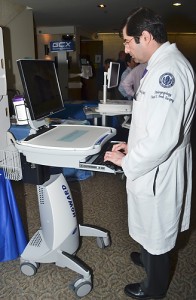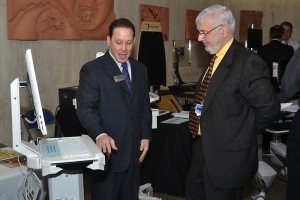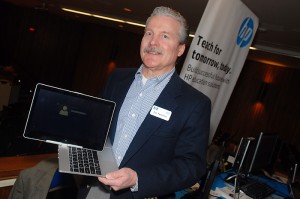
NBC News
Sonia greets her new parents, Kristina and Rich England.
By Jim Maceda, Correspondent, NBC News
BRYANSK, Russia --?Kristi and Rich England of Marshall, Minn., shook with nerves and joy on their fourth and last trip to an orphanage in Bryansk, in?rural Russia. ?
They were finally taking Sonia, a partially blind and hyperactive 3-year-old, home with them.?The tearful Feb. 12 meeting, punctuated by Sonia?s screams of ?mama? and ?dada,? was all the more emotional because the Englands knew that they were the last lucky couple to leave Russia with an adopted child.?
?So many other families have seen their children and have loved their children and can?t bring them home,? said Kristi England, 34, a family doctor. ?It?s so unfair in so many ways.?
Those already undergoing the costly process of adopting a child from Russia found out Russian president Vladimir Putin signed a law barring any future adoptions, canceling the ones in progress. NBC's Kerry Sanders reports.
The process wasn?t easy ? the Englands endured multiple background checks and spent at least $50,000 to ensure that Sonia, now called Sophia, could go home with them.
But the ban signed into law on Dec. 28 barring all U.S. adoptions ? which numbered more than 60,000 over the past two decades ? has marooned hundreds of families in the middle of adopting, and stranded thousands of children in orphanages throughout Russia.??
"We should do all we can so that orphaned children find a family in our country, in Russia," President Vladimir Putin said in defense of the ban.
Fueling the outrage in Russia over the fate of children adopted by Americans, Russian media reported earlier this week that Alexander Abnosov, 18, showed up in the Volga River port town of Cheboksary saying his adoptive family had mistreated him. He had left Russia five years earlier, having been adopted by a family outside Philadelphia, but said he fled after suffering from verbal abuse by his adoptive mother. ?
"She would make any small problem big and always try to find a reason to shout at you," he told Russia?s state-owned Channel 1.
While UNICEF estimates there are about 740,000 children not in parental custody in Russia, only about 18,000 Russians are on the waiting list to adopt.?
But while Putin denies any direct connection, Kremlin-watchers say the ban is really about geopolitics and not about protecting kids.

NBC News
Russian child psychologist Valentina Rakova Valentina (left) stands with Kristina and Richard England and newly adopted Sonia in an orphanage in Bryansk, rural Russia.
They say it was retaliation by Moscow for an American law banning any Russian human rights violators from U.S. soil, enacted after the suspicious death in prison of Sergey Magnitsky, a Russian lawyer working for Heritage Fund, an American private equity firm.?
Russian media didn't hesitate to bolster the official line. ?
Despite the negative reports, child psychologist Valentina Rakova, who has worked in the Bryansk orphanage for 30 years, says the ban is terrible for children.?
?Here in Russia we have many examples of bad parents -- even worse than these American cases -- where kids are just tossed out,? she said as she coiffed Sonia, who requires special medical attention.
?A child like Sonia, no Russian would accept her,? Rakova said. ?Before the ban, orphans were offered to Russian families but no one took them in.??
Rakova's experience confirms the U.N.'s statistics. As far as she has seen, Americans are far more likely to adopt children who are ill or suffer from a disability.
Becky Preece, a housewife from Nampa, Idaho, is one such American. ?
She was finally able to take home 4-year-old Gabe, who has Down syndrome, in February, after years of filling out paperwork and a court battle. ?
Preece, who like the Englands beat the ban by days but was then delayed by red tape, said she saw a complete disconnect between the horrors of Russia?s adoption ban and the kindness and hospitality of the Russians themselves.?

NBC News
Becky Preece from Nampa, Idaho, adopted 4-year-old Gabe just days before the ban on Americans adopting Russian orphans went into force.
?It?s not a matter of the people,? she said while walking with the little boy in the thick Moscow snow.
?It?s politically charged and it?s something that is hard for us to understand because it?s so different from the experience that we?ve had here.?
Preece said she was excited to get Gabe into school back home, and watch him bond with his new brother who also has Down syndrome.?
?They need the infrastructure, they need the kind of support that we get at home for our children,? she said.?
But for the hundreds of American families who missed the cut and are now unable to bring their adoptive children home, the future could mean months -- even years -- of waiting and praying that the two superpower rivals find common ground before more of society?s most vulnerable pay the price.
The Associated Press contributed to this report.
Jim Maceda is a London-based correspondent who has covered the Soviet Union and Russia since the 1980s.?
Related:
Boy's Christmas wish: Adoption of little brother caught in US-Russia spat
Thousands march in Moscow to protest Russian adoption ban
?
?
?
?
?
?
?
knicks the monkees ciaa love actually strikeforce davy jones deep impact
 After I had been running at night for more than a decade, a relatively under-the-radar service called Nextdoor got me to start running during the day. Almost nobody likes to exercise, and for many, overcoming the motivational hump of putting on your shoes and gym clothes can be trying on even the best of days. One evening late in January I had finally overcome this initial barrier to entry, and was just about to stop blogging to do my usual 30-minute nightly sprint when I got the email. “Woman robbed at gunpoint in Dogpatch, San Francisco” the subject line screamed. Unlike many of the emails I constantly receive, this was highly relevant to me, especially because, upon further inspection, the robbery had happened one block from my house. Until this email, I hadn’t given too much thought to Nextdoor, a service that I signed up for at the Allen & Co conference last summer, where co-founder Nirav Tolia?had given a talk about the local social network. The company started out as Fanbase in 2009, and was an attempt to create a user-generated content version of ESPN. Founders Tolia and Sarah Leary decided to pivot around May of 2010, and spent the next four to five months testing out different ideas. Fanbase officially pivoted to Nextdoor in September of 2010, starting out its pilot in Lorelei, a neighborhood in Menlo Park. Now a Facebook for your neighborhood, about half the Fanbase funding ended up carrying over, and Tolia and Leary ended up raising an additional $40.2 million for the new Nextdoor product. Initially enthusiastic, I had also invited my neighbors to use the platform, which had resulted in a de facto neighborhood support group (including the services of a pet psychic) when their adventurous cat Kiki went missing. I wrote a post about it for TechCrunch and then sort of forgot about it, rarely logging on to peruse the listings of free stuff and garage sales. Well I was certainly giving the service some thought now: “What if I had been that woman who was robbed?”"What if I had ventured out of my house just 15 minutes earlier?” I was still in my gym clothes, after so much effort, and feeling antsy from my day of work. Worse, I was now worried about a random stranger I had only heard about through the Internet, and I still needed a run badly.
After I had been running at night for more than a decade, a relatively under-the-radar service called Nextdoor got me to start running during the day. Almost nobody likes to exercise, and for many, overcoming the motivational hump of putting on your shoes and gym clothes can be trying on even the best of days. One evening late in January I had finally overcome this initial barrier to entry, and was just about to stop blogging to do my usual 30-minute nightly sprint when I got the email. “Woman robbed at gunpoint in Dogpatch, San Francisco” the subject line screamed. Unlike many of the emails I constantly receive, this was highly relevant to me, especially because, upon further inspection, the robbery had happened one block from my house. Until this email, I hadn’t given too much thought to Nextdoor, a service that I signed up for at the Allen & Co conference last summer, where co-founder Nirav Tolia?had given a talk about the local social network. The company started out as Fanbase in 2009, and was an attempt to create a user-generated content version of ESPN. Founders Tolia and Sarah Leary decided to pivot around May of 2010, and spent the next four to five months testing out different ideas. Fanbase officially pivoted to Nextdoor in September of 2010, starting out its pilot in Lorelei, a neighborhood in Menlo Park. Now a Facebook for your neighborhood, about half the Fanbase funding ended up carrying over, and Tolia and Leary ended up raising an additional $40.2 million for the new Nextdoor product. Initially enthusiastic, I had also invited my neighbors to use the platform, which had resulted in a de facto neighborhood support group (including the services of a pet psychic) when their adventurous cat Kiki went missing. I wrote a post about it for TechCrunch and then sort of forgot about it, rarely logging on to peruse the listings of free stuff and garage sales. Well I was certainly giving the service some thought now: “What if I had been that woman who was robbed?”"What if I had ventured out of my house just 15 minutes earlier?” I was still in my gym clothes, after so much effort, and feeling antsy from my day of work. Worse, I was now worried about a random stranger I had only heard about through the Internet, and I still needed a run badly.





 A confidential presentation that describes a Shenzhen-based manufacturer's 2013 product plans points to a few interesting bits of information about the iPhone 5S launch in June 2013 and
A confidential presentation that describes a Shenzhen-based manufacturer's 2013 product plans points to a few interesting bits of information about the iPhone 5S launch in June 2013 and 



